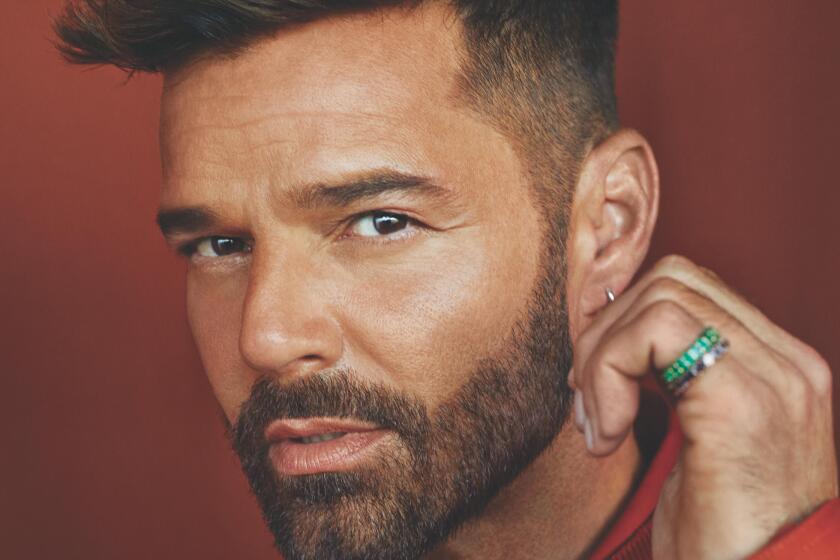For Bush-critiquing L.A. band, a surprising invitation
CAIRO -- No way, the band members told their manager.
Was she really saying that the same U.S. government pursuing an unpopular war in Iraq now wanted to hire the funk-infused Latin Los Angeles band Ozomatli to travel around the world and play music on behalf of America?
Didn’t they know that the two-time Grammy-winning band was born at a labor rights demonstration 12 years ago, that it regularly played at antiwar rallies and that its members were outspoken critics of the Bush administration’s policies on everything from the war on terror to immigration?
That improbable scenario has become a reality, evidenced here this week when hundreds of fans made their way up to Cairo’s Citadel to see Ozomatli perform.
“We are so happy to be in this beautiful city tonight,” vocalist and guitarist Raul Pacheco called out to more than 1,000 cheering fans gathered Monday on the site of the same ancient hilltop fortress where Saladin fended off the Crusaders in the 12th century. “We came all the way here from Los Angeles, California!”
Three thousand showed up to hear Ozomatli play in the Egyptian coastal town of Alexandria on Sunday night. On Monday night, the band performed a crisp 90-minute set before young Cairo residents, many of them women dancing while wearing Islamic head scarves. Ozomatli had already played at U.S.-sponsored events this year in India, Nepal, Tunis and Jordan. Now it brought its musical mélange to the heart of the Arab world, which is locked in what some describe as a clash of civilizations with the West.
That’s a view of the world the band members reject. Saxophonist Ulises Bella called the odd grouping of Ozomatli and the State Department -- as well as a smattering of corporate sponsors -- a “cry for change all around.”
“Our world standing has deteriorated,” Bella said just before a short concert for Egyptian orphans at a Cairo park last Saturday. “I’m totally willing and wanting to give a different image of America than America has given over the last five years.”
During the Cold War, the State Department recruited jazz musicians as cultural emissaries. Mostly African Americans, who faced discrimination at home, musicians such as Dizzy Gillespie, Louis Armstrong, Charles Mingus and Ornette Coleman were “jazz ambassadors,” playing gigs bankrolled by the U.S. government all over the world, including Communist countries. Such cultural outreach faded over the decades but has been revived in recent years by Karen Hughes, the U.S. undersecretary of State for public diplomacy. Last year, the Washington, D.C., hip-hop quartet Opus Akoben toured Cairo and other places in the Middle East.
“These things cost a little bit of money, but compare it to the cost of not having the standing we had in the past, when people thought they knew us and what we stood for,” said U.S. Ambassador to Egypt Francis Ricciardone, who addressed the crowd wearing a black Ozomatli T-shirt. “People talk about it as soft power. But it’s real power.”
A U.S. Embassy official in Nepal heard about Ozomatli on a radio show while visiting Washington last year and approached band manager Amy Blackman-Romero. U.S. officials are eager to present an image of America and Americans different from the footage of soldiers fighting insurgents in Iraq broadcast on Arab news channels.
Months of haggling ensued. “We wanted them to know the band plays a lot of antiwar rallies,” said Blackman-Romero, who joined the group on the tour. “They told us they were completely comfortable with who the band is. But when they’re out here, it’s about the music, not the politics.’ ”
Band members didn’t need much prodding to accept all- expenses-paid trips to the Middle East and the Indian subcontinent. Since shortly before Sept. 11, the band has woven Arabic rhythms, North African musicians and samples of the late Pakistani singer Nusrat Fateh Ali Khan into its Latin sound. A Palestinian friend had turned Bella on to the legendary Egyptian singer Um Kalthoum.
“The press in the U.S. is kind of dehumanizing this whole area,” said bassist Wil-Dog Abers “It’s one of the reasons we started getting into Middle Eastern and North African music.”
So far the tours, through India and Nepal in February and the Middle East this month, have gone without a hitch. In Katmandu, an estimated 12,000 showed up to hear the band play. In India, reporters hammered the band members with questions about U.S. foreign policy, which they said they answered candidly. In Jordan, they played a free show at a Palestinian refugee camp, where children danced to their music.
“Music more than language is a cultural bridge,” said Shaymaa Mohammad, a 21-year-old graduate of Cairo University, swaying to the band’s Latin-inflected rhythms under a full moon on Monday.
Most fans said they hardly needed to be convinced of Americans’ good-hearted nature but that they have many problems with the U.S. government’s Middle East policies. “I guess I’ve never changed my opinion about America,” said Damer Haroun, a 19-year-old student at the College of Applied Arts here. “I never had a problem with the people. But sometimes I feel like the people need to feel the mistakes of their government.”
More to Read
The biggest entertainment stories
Get our big stories about Hollywood, film, television, music, arts, culture and more right in your inbox as soon as they publish.
You may occasionally receive promotional content from the Los Angeles Times.






